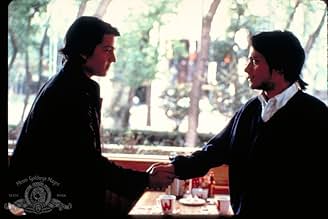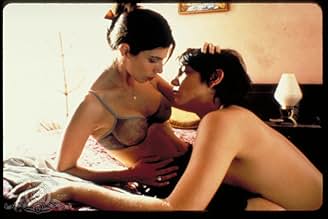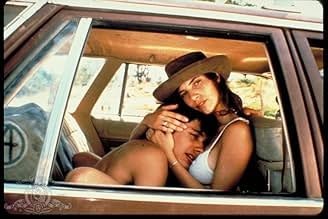No México, dois adolescentes e uma mulher mais velha, se embarcam numa viagem e aprendem sobre a vida, a amizade, o sexo e o outras coisas.No México, dois adolescentes e uma mulher mais velha, se embarcam numa viagem e aprendem sobre a vida, a amizade, o sexo e o outras coisas.No México, dois adolescentes e uma mulher mais velha, se embarcam numa viagem e aprendem sobre a vida, a amizade, o sexo e o outras coisas.
- Direção
- Roteiristas
- Artistas
- Indicado a 1 Oscar
- 39 vitórias e 48 indicações no total
Daniel Giménez Cacho
- Narrator
- (narração)
- Direção
- Roteiristas
- Elenco e equipe completos
- Produção, bilheteria e muito mais no IMDbPro
Avaliações em destaque
In many ways Alfonso Cuaron's "Y Tu Mama Tambien" reminds me of the desolation theme of Bernardo Bertolucci's "Ultimo tango a Parigi" (1972) and the deceptive perspective of Michelangelo Antonioni's "L'Avventura." (1960).
Raging post-adolescent hormonal drives seem to propel Julio and Tenoch forward, with little else of substance to account for. Likewise, Luisa's motivation seems more despair- than romance-driven. Thus, the trio's trek in search of the idyllic Boca del Cielo is reminiscent of the forlorn lovers' quest for emotional fulfillment in the Bertolucci film.
Comparison with the Antonioni opus stems from Cuaron's script seemingly being about a carefree, liberated trio on a journey for fun, when in fact, it's really about escape from their own worst "enemies"--themselves.
After a particularly talky beginning (complete with abundant narrations) the film settles in on its main theme, and the dialogue becomes more pointed. While the camera work is generally appropriate, Cuaron tends to rely on long- to medium-shots, with nary a close-up.
The result of this is a somewhat distant enactment, in which the viewer is held a bit at arm's length from the action. One seldom gets close enough to become intimately acquainted with these people. In the end, one is touched by important revelations which are crucial to understanding that which has transpired. Yet, the viewer's emotional involvement is perhaps less than what it might have been, given closer perspectives.
This film obviously impressed many people, and I must agree the work by the principles is uniformly solid. This is a "last tango" which has made its mark as a distinctive film work.
Raging post-adolescent hormonal drives seem to propel Julio and Tenoch forward, with little else of substance to account for. Likewise, Luisa's motivation seems more despair- than romance-driven. Thus, the trio's trek in search of the idyllic Boca del Cielo is reminiscent of the forlorn lovers' quest for emotional fulfillment in the Bertolucci film.
Comparison with the Antonioni opus stems from Cuaron's script seemingly being about a carefree, liberated trio on a journey for fun, when in fact, it's really about escape from their own worst "enemies"--themselves.
After a particularly talky beginning (complete with abundant narrations) the film settles in on its main theme, and the dialogue becomes more pointed. While the camera work is generally appropriate, Cuaron tends to rely on long- to medium-shots, with nary a close-up.
The result of this is a somewhat distant enactment, in which the viewer is held a bit at arm's length from the action. One seldom gets close enough to become intimately acquainted with these people. In the end, one is touched by important revelations which are crucial to understanding that which has transpired. Yet, the viewer's emotional involvement is perhaps less than what it might have been, given closer perspectives.
This film obviously impressed many people, and I must agree the work by the principles is uniformly solid. This is a "last tango" which has made its mark as a distinctive film work.
After watching this movie, I looked at what a few critics had to say about it and I was shocked to see some of them refer to this movie as a "teen sex comedy". Wow, I didn't get that impression at all! Yes, the movie is infused with sex, and the two lead characters are horny teens, and there are quite a few comedic moments, but this is far from a teen sex comedy. It's treatment of the subject matter is real, for one thing, and backdrop of the Mexican countryside (and the director's detached observation's through third-person narration) bring some sobriety to the film. Be warned, though: there is a lot of sex, so not exactly a movie you're going to want to watch with the in-laws.
People don't get this movie..there is so much more the just coming of age and having sex. It is also about the social disparity in Mexico. That is what all the overdubs were for. Every time there was an voice-over something of meaning was said about the surroundings and the way the average Mexican lives. Don't think of this movie as a story about three people, think of it as a story about a whole nation. I encourage everyone to watch it again. Please pay attention to the scene in the boat. that almost makes me cry. It is so well worded also. And the way the voiceovers just cut abruptly is a great. There are so many small things about this movie that make it so much better then your average Hollywood movie.
Alfonso Cuaron is simply one of the best Mexican directors in recent years in Mexican film production. His incredible AIDS-driven comedy, "Solo Con Tu Pareja" was maybe the most funny Mexican picture in a long time, and his always present criticism to the way of life of Mexican people in a city such as Mexico City, is incredible accurate and clever. His other projects in the United States, "Little Princess" and "Great Expectations" were beautifully-manufactured motion pictures, with the help (or support, if you may) of the marvellous photographer Emmanuel Lubenzki ("Sleepy Hollow", and the above-mentioned Cuaron movies). Returning to his home country this time, Cuaron displays such magic and poetic visuals, in contrast with the subtle criticism to the society in Mexico, and the clever and sharp dialogs between the leading stars, using every word young Mexicans use to apply in their conversations.
"Y Tu Mama Tambien" (And Your Mother Too) is, in the surface, a really funny story about 2 friends-almost-brothers, Tenoch Iturbide (an outstanding Diego Luna) and Julio (a really incredible performance for the recent Ariel, the Mexican Academy Award, winner Gael Garcia Bernal, in another excellent portray of a young guy with "issues"), that plan a trip to an imaginary beach, "Boca del Cielo" (Heaven´s Mouth) in order to flirt with a Spanish girl, married with Tenoch's cousin, and portrayed by a credible Maribel Verdu.
But this is only the "surface" of this road movie. In fact, we are dealing with dreams and realities, with social problems and political ones. Tenoch is a young guy living with a millionaire family, son of a wealthy businessman with friends in the highest "stairs" of Mexican politics, with a second name such as Iturbide (one of the most important and powerful leaders of Mexican politic history). And, in contrast, Julio is a middle-low-class guy, living with his mother, brothers and sisters, in a small department, with a last name such as Zapata (a revolutionary leader in Mexican history, with native origins, that took part in the Revolution at the beginning of 20th Century). This is a clever and sharp critic of the different models of living of these 2 friends, and in fact, of all Mexican citizens (I know it, because I'm Mexican, too).
Also, the movie has an excellent narration by Daniel Gimenez Cacho, star of a previous Cuaron film, "Solo Con Tu Pareja", that explains the things we cannot see, but that we can understand and feel. The "subtle critic about Mexican society and traditions" that I have talked about all along this comment, is the one thing that makes this picture go from a funny comedy to an intelligent essay of the lives of young people, social classes, discovery and re-discovery of personality and our own soul, and the final revelation of who we are and what we become when time passes by. In the lives of Julio and Tenoch there is no redemption, but a clear message of their goal in life, their true feelings about friendship, and their sexuality. This road trip is only a pretext to tell a story about discovery and finding our true nature.
Yes, maybe it is a little provocative and bold, but because of these characteristics, "And Your Mother Too" is an incredible motion picture, true to its meaning and compromised with the reality it is trying to show. We care about this people, we care about their problems, and at the end, we care about our own society, and we care about what we have become with time. And the true meaning of the movie's title, "And Your Mother Too", within the narrative of the film, is simply hilarious.
Give this movie a chance, and see it. You won't be disappointed. It has an excellent direction, excellent photography, its is very sexy, it showcases credible performances by all its cast. But above all, it has a real story, real character development, and real power. One great movie from a great Mexican director. Maybe not his best, but really near.
"Y Tu Mama Tambien" (And Your Mother Too) is, in the surface, a really funny story about 2 friends-almost-brothers, Tenoch Iturbide (an outstanding Diego Luna) and Julio (a really incredible performance for the recent Ariel, the Mexican Academy Award, winner Gael Garcia Bernal, in another excellent portray of a young guy with "issues"), that plan a trip to an imaginary beach, "Boca del Cielo" (Heaven´s Mouth) in order to flirt with a Spanish girl, married with Tenoch's cousin, and portrayed by a credible Maribel Verdu.
But this is only the "surface" of this road movie. In fact, we are dealing with dreams and realities, with social problems and political ones. Tenoch is a young guy living with a millionaire family, son of a wealthy businessman with friends in the highest "stairs" of Mexican politics, with a second name such as Iturbide (one of the most important and powerful leaders of Mexican politic history). And, in contrast, Julio is a middle-low-class guy, living with his mother, brothers and sisters, in a small department, with a last name such as Zapata (a revolutionary leader in Mexican history, with native origins, that took part in the Revolution at the beginning of 20th Century). This is a clever and sharp critic of the different models of living of these 2 friends, and in fact, of all Mexican citizens (I know it, because I'm Mexican, too).
Also, the movie has an excellent narration by Daniel Gimenez Cacho, star of a previous Cuaron film, "Solo Con Tu Pareja", that explains the things we cannot see, but that we can understand and feel. The "subtle critic about Mexican society and traditions" that I have talked about all along this comment, is the one thing that makes this picture go from a funny comedy to an intelligent essay of the lives of young people, social classes, discovery and re-discovery of personality and our own soul, and the final revelation of who we are and what we become when time passes by. In the lives of Julio and Tenoch there is no redemption, but a clear message of their goal in life, their true feelings about friendship, and their sexuality. This road trip is only a pretext to tell a story about discovery and finding our true nature.
Yes, maybe it is a little provocative and bold, but because of these characteristics, "And Your Mother Too" is an incredible motion picture, true to its meaning and compromised with the reality it is trying to show. We care about this people, we care about their problems, and at the end, we care about our own society, and we care about what we have become with time. And the true meaning of the movie's title, "And Your Mother Too", within the narrative of the film, is simply hilarious.
Give this movie a chance, and see it. You won't be disappointed. It has an excellent direction, excellent photography, its is very sexy, it showcases credible performances by all its cast. But above all, it has a real story, real character development, and real power. One great movie from a great Mexican director. Maybe not his best, but really near.
From the recent comments on this film board, it's amazing how people can watch this film all the way through and at the end not have any idea what it was about.
This was quite simply one of the best films I've seen in recent years. Using three central characters -- two immature adolescent males and a young woman in crisis -- set in a road-trip situation, it was hardly a road-trip movie. Nor was it an adolescent movie. Nor was it a woman-in-crisis movie. Nor was it about sex. Instead, what starts out with a sizzling but ditzy prologue becomes something much deeper and much more profound as it goes along. By the end I was breathless and somewhat stunned. The character study is amazing. The societal insights are haunting. The shared humanity it exposes is painful at time but ultimately reaffirming and uplifting. These are three of the most memorable, identifiable and completely human characters I've seen on screen in ages. They taught me more about life and the human species than the last ten movies I've seen put together. I'll not soon forget Julio, Tenoch and Luisa and their eye-opening journey to Boca del Cielo.
This was quite simply one of the best films I've seen in recent years. Using three central characters -- two immature adolescent males and a young woman in crisis -- set in a road-trip situation, it was hardly a road-trip movie. Nor was it an adolescent movie. Nor was it a woman-in-crisis movie. Nor was it about sex. Instead, what starts out with a sizzling but ditzy prologue becomes something much deeper and much more profound as it goes along. By the end I was breathless and somewhat stunned. The character study is amazing. The societal insights are haunting. The shared humanity it exposes is painful at time but ultimately reaffirming and uplifting. These are three of the most memorable, identifiable and completely human characters I've seen on screen in ages. They taught me more about life and the human species than the last ten movies I've seen put together. I'll not soon forget Julio, Tenoch and Luisa and their eye-opening journey to Boca del Cielo.
Você sabia?
- CuriosidadesAlfonso Cuarón did not want to cast Luna for the role of Tenoch because he was a teen idol and soap opera star. Bernal convinced Cuarón to hire Luna because their strong existing friendship would make the performance of their characters' friendship much easier. Cuarón ultimately hired Luna because he became convinced that their bond would produce a natural and honest performance.
- Erros de gravaçãoThe movie takes place in the summertime - we know this from the boys just having graduated, their girls going off to Europe, the weather, etc. Yet at the wedding near the beginning of the film, the narrator tells us that in a few days the president of Mexico will go to Seattle for the WTO conference - which happened in November.
- Versões alternativasSeveral scenes edited out of the final movie were made available for public viewing on the movie's official Web site. The director claims to have created multiple edits of this film to satisfy censorship rules around the world. According to the director, one of these edits, allegedly intended for Mexican distribution in protest of that country's heavy censorship, runs less than 10 minutes.
- ConexõesEdited into Y tu mamá también: Deleted Scenes (2002)
- Trilhas sonorasGo Shopping
Performed by Bran Van 3000
Contains samples from "Shopping" written by Eek-A-Mouse (as Ripton Hylton) and Jamal-Ski
Published by Plaything Music, Explicit Two & Eek-A-Mouse Music
administered by Plaything Music (ASCAP)
Eek-A-Mouse appears courtesy of Explicit Entertainment, by license from Sunset Boulevard Entertainment
Principais escolhas
Faça login para avaliar e ver a lista de recomendações personalizadas
Detalhes
Bilheteria
- Orçamento
- US$ 2.000.000 (estimativa)
- Faturamento bruto nos EUA e Canadá
- US$ 13.839.658
- Fim de semana de estreia nos EUA e Canadá
- US$ 408.091
- 17 de mar. de 2002
- Faturamento bruto mundial
- US$ 33.616.692
- Tempo de duração
- 1 h 46 min(106 min)
- Cor
- Mixagem de som
- Proporção
- 1.85 : 1
Contribua para esta página
Sugerir uma alteração ou adicionar conteúdo ausente

![Assistir a Tráiler [OV]](https://m.media-amazon.com/images/M/MV5BZDE5YjEwYTktN2NiYy00ZmZiLTk3YmEtOTYyYzljMTdkMGMzXkEyXkFqcGdeQXRodW1ibmFpbC1pbml0aWFsaXplcg@@._V1_QL75_UX500_CR0)
































